If you're ever in the mood for some yuks, take a casual stroll up and down the aisles in a CVS pharmacy and see if you can't find a bunch of stuff that shouldn't be sold there (maybe even anywhere). It's not that hard. I recently took that stroll. Here are three doozies that take insanity to a new level.
1. Non-Homeopathic-Homeopathic Arnica
It's one thing when people choose to pee away money on homeopathic nonsense, but as consumers, they have rights, too! If I'm from Neptune an apostle of homeopathy, I am well within my rights to demand that the bottle I'm purchasing contain absolutely nothing except water. No therapeutic drugs or chemicals will be tolerated. Placebo only!
So, imagine my surprise when I saw a strange sight – homeopathic arnica that appears to actually contain a contaminant – real arnica. How can this be? Beats me, but here it is.
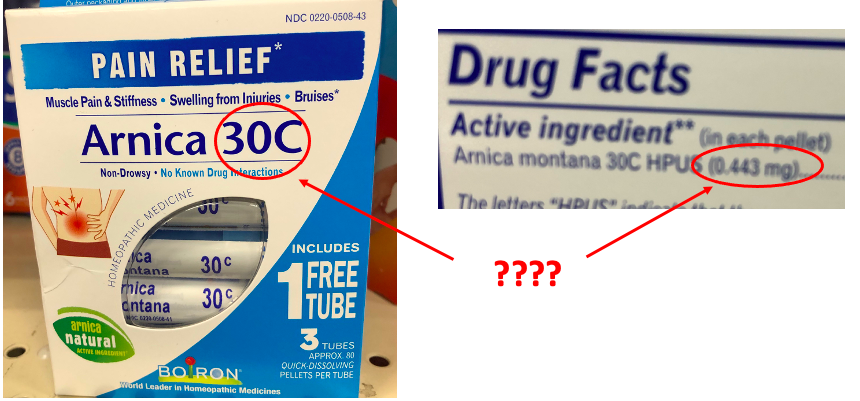
Figure 1. Boiron's Arnica claims to be diluted to a "strength" of 30C but also contains a measurable amount (0.443 mg) of arnica – 0.443 mg more than you'd expect. This makes even less sense than "normal" homeopathic "principles."
To understand this odd inconsistency, we need to learn what 30C means. Figure 2 should give you an idea about what dilution factors mean, bearing in mind the lunacy behind homeopathy is that solutions of [stuff] get stronger as those solutions become more dilute.

Figure 2. Serial 100-fold dilutions.
As shown in Figure 2, if you start with a solution of 1 mg of some crap and dilute it by 100X with distilled water (10 mL of the "mother tincture" added to 990 mL water), this is called 1C. The new solution will now contain 0.01 mg of the crap in 1 liter of water. Repeat this once more and you now have a 2C solution (.0001 mg per liter) – 10,000-times more dilute than the original solution. (According to homeopathic principles, the 2C solution is "stronger" than the 1C solution.) It should be obvious that with a series of 100-fold dilutions there's not going to be a whole lot of material around before long.
In fact, it is possible to calculate the dilution at which point nothing remains. This occurs around 13C – a dilution of 1026 times, yet 30C arnica should contain far fewer than zero molecules of the stuff. (How much is 1026? This much: 100,000,000,000,000,000,000,000,000.)
ACSH friend Dr. Joe Schwarcz, the Director of McGill University's “Office for Science and Society” and a well-known debunker of junk science is not a big fan of homeopathy:
When does dilution become delusion? When homeopaths suggest that a solution can have a biological effect even though it has been diluted to an extent that it does not contain a single molecule of the original solute. ( i.e beyond 12C in homeopathic terms.) While such solutions contain no active ingredient, they can contain a significant dose of placebo.
Joe Schwarcz, Ph.D., 6/1/21
Speaking of a placebo, it would not be incorrect to call Boiron's Arnica 30C just that – a sugar pill. Two sugars, really. Here is the "inactive ingredient" list.

So, if the entire premise behind homeopathy is strange, it is even stranger that a sugar pellet of a 30C solution contains 0.443 mg of arnica, introducing a rather odd dichotomy where the label makes two different and opposing claims, both false.
And here's an interesting little thought experiment.

Image: Wikimedia Commons
CVS is charging $21.99 for three tubes of 80 pellets while Amazon will drone the same stuff to you for only $15.96. Which brings up an existential question that might make your head explode: which is a better bargain? Clearly, Amazon gives you more pills for your money, but shouldn't we at least consider the possibility that you are better off with fewer pills? If more dilute = more potent then shouldn't fewer pills = more effective? Let's just call this "homeopathic economics" and put it on the back burner and let finer minds than mine cogitate about this.
2. Lysine for Cold Sores?
Here's a clever product – Quantum Health's "Lip Clear Lysine+ Cold Sore Treatment." The unsuspecting consumer would assume that the stuff contained lysine (an amino acid) and that this somehow helped to get rid of oral herpes outbreaks faster.
The evidence of lysine's efficacy in healing cold sores is mixed. A 2017 review article in the Journal of Integrative Medicine concluded...
Two randomized controlled trials showed no significant therapeutic effect from lysine supplements to treat active herpes simplex sores.
... but the dose might make a difference...
L-lysine supplementation appears to be ineffective for prophylaxis or treatment of herpes simplex lesions with doses of less than 1 g/d without low-arginine diets. Doses in excess of 3 g/d appear to improve patients’ subjective experience of the disease. [emphasis added]
Quantum Health, the company that markets Lysine+ claims:
- Immediate relief cold sore treatment
- Soothes and doesn't burn
- Reduces healing time by 50%
Who's correct? Who knows, but a look at the Lysine+ box raises some interesting (and bizarre) questions.
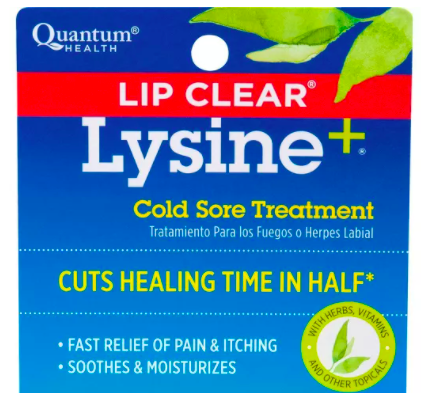
The front of Quantum Health's Lysine+package.
The front of the box seems straightforward enough. Quantum claims that the ointment makes the cold sore feel better and go away faster. Let's accept this at face value.
The back of the box takes us on an excursion deep into the bowels of Bizarro World. If you understand what's going on here please let me know, because I sure don't.
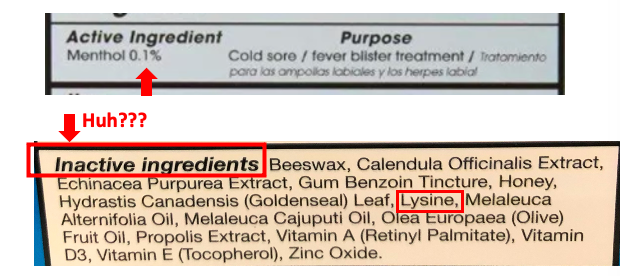
Labelis loonialis.
Quantum lists one active ingredient, and it's... menthol, which is used, along with camphor, in much higher concentrations, in many of the OTC cold sore remedies. Nothing wrong with it; it's a local anesthetic that will make the booboo feel better. Bbbbbbut... what about the magic lysine? It shows up #7 on a list of inactive ingredients, nestled between Goldenseal leaf and Melaleuca Alternifolia oil. Something is truly strange here. If the lysine is actually therapeutic, then it really ought to be listed as an active ingredient, no? And if it's not an active ingredient, then what's with the name of the product? It would seem that these guys need to modify the label a bit. Maybe like this.

A more accurate label for Lysine+?
3. DHEA
DHEA, short for dehydroepiandrosterone is sold as (god knows why) a nutritional supplement. It is nothing of the sort. It's a very close chemical relative of testosterone and a potentially dangerous performance-enhancing steroid that is banned from organized sports worldwide.
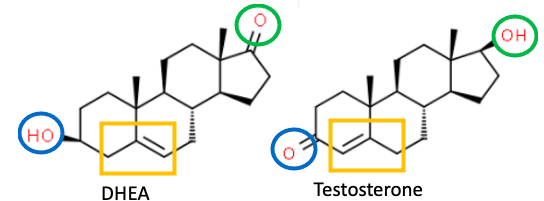
The chemical structures of DHEA (L) and testosterone (R). They differ only by oxidation state (green and blue circles) and the position of the carbon-carbon double bond (orange rectangle).
But it gets worse. From the journal Cellular Physiology and Biochemistry:
"As a steroid hormone precursor, DHEA can be rapidly converted into androstenedione by 3β-hydroxysteroid dehydrogenase (3β-HSD) in peripheral target tissues, and then undergo further conversion to testosterone and estradiol..."
Liu, et. at., Cell Physiol Biochem 2015;36:1778-1792, https://doi.org/10.1159/000430150
So, we have a "dietary supplement" that is a precursor to both male and female hormones. What could possibly go wrong? Facial hair growth in women and breast growth in men are two relatively minor (possibly even desirable?) side effects, but cancer promotion is neither:
DHEA is a hormone. Use of this supplement might increase levels of androgen and have a steroid effect. DHEA also might increase the risk of hormone-sensitive cancers, including prostate, breast and ovarian cancers. If you have any form of cancer or are at risk of cancer, don't use DHEA.
Source: Mayo Clinic
Irony time!
Isn't it at least slightly amusing that an anabolic steroid with gender-changing properties and a cancer warning is found in health food and vitamin stores like GNC, while at the same time...
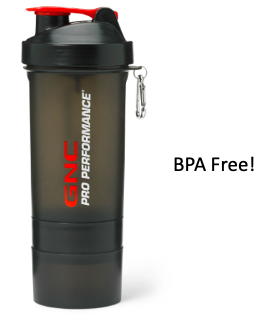
...some Darth-Vader-looking bottle is marketed as BPA-free? (1)
You bet! But in Supplementland, nothing really makes a whole lot of sense. Up is up and so is down.
Anyhow, I've had enough. Time's up. Or is it down?
NOTE:
(1) Academics and NGOs have forever been trying to equate the plastic component bisphenol A (BPA) as a hormone-altering death sentence in the making. As I have written before, it is not.




